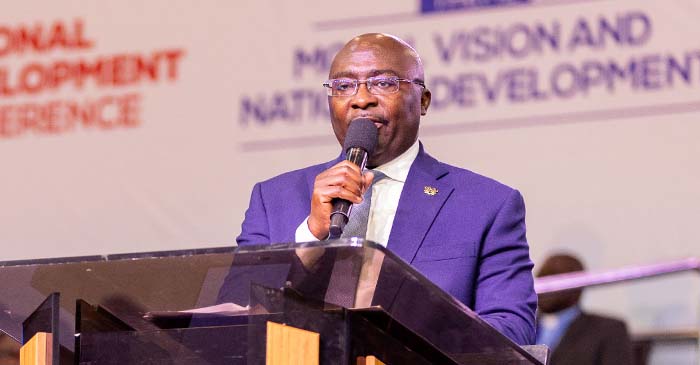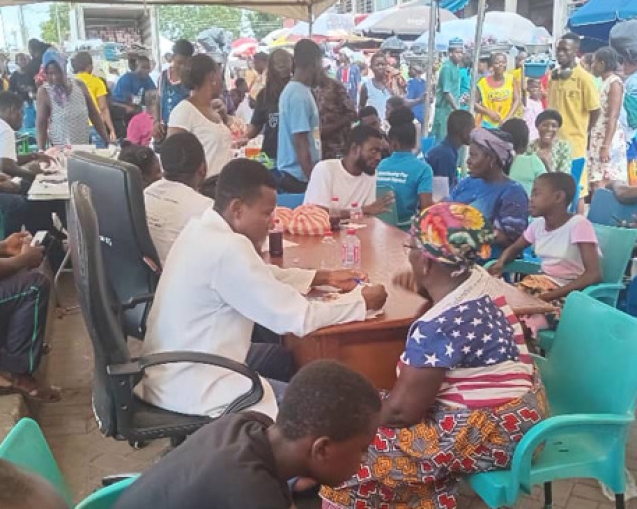The Vice President of Ghana, His Excellency Dr. Mahamudu Bawumia, has commended The Church of Pentecost for its continued support to national development, describing the Church as a “steadfast development partner.”
“Indeed, the contribution of The Church of Pentecost to education, healthcare, social welfare and the financial development of Ghana continues to merit the unalloyed gratitude of the Ghanaian people,” the vice president said when he addressed participants at the National Development Conference 2023 (NADEC’23), organised by The Church of Pentecost, on Wednesday, July 26, 2023.
The conference held under the theme ‘Moral Vision and National Development’ was attended by all major stakeholders in Ghana’s development, including former presidents H.E J.A. Kufuor and H.E. John Mahama; Speaker of Parliament, Rt Hon Alban S.K. Bagbin; the Chief Justice, Her Ladyship, Justice Gertrude Torkonoo, National Executives of political parties, leaders of religious bodies, civil society organisations and governance experts.
Alluding to the theme for the conference, the Vice President pledged that Government would work assiduously for the “establishment of a free and just society, where entrepreneurship and individual initiative are the sources of wealth creation with a strong social safety net for the marginalised and disadvantaged; and the improvement of the governance architecture to deepen accountability and respect for the rule of law in our body politic.”
He said that the government of Ghana is leveraging digitalisation to shape national discourse and promote behavioural change based on moral principles.
Outlining the positive effects achieved by the ongoing infusion of digitalisation in daily national life, Dr Bawumia said Government had taken a deliberate decision to reduce the human interface, which is usually the arena for corruption, in order to reduce its incidence and cultivate a new approach to national life.
“The behaviour of the people determines the transformation of a nation. This is why, as a government, we have focused on putting in place systems that will reduce the role of the human factor and enhance transparency through the digitalisation of the economy. We have put in place systems that will encourage or compel morally upright behaviour.”
“Through digitalisation, we are compelling behaviour that is morally upright”, he continued, noting that by reducing the human interface, state institutions and their clients have no choice but to do the right things and pay the right fees because “computers don’t understand bribes,” he said
Dr Bawumia cited the major impacts digitalisation has had on efficiency and revenue generation in some key government institutions.
“The DVLA is now a world-class institution, without the need for ‘goro boys’. Now you can apply for a passport online and have it delivered to your house without having to pay a bribe. The port is now paperless, and clearing your goods has become much easier.
“Digitalisation has also had a major impact on revenue generation. Take the Electricity Company of Ghana, for instance. Before digitalisation, the company collected an average of GHS 450 million a month. We noticed that this figure had not changed for some years, despite an increase in customers. Something clearly was not right. So, we introduced digitalisation into their processes and made all payments cashless. Despite initial resistance, the system is working smoothly. And interestingly, the monthly revenue has shot up from GHS 450 million a month to GHS 1.2 billion a month,” he disclosed.
“Before digitalisation, the Passport Office generated an average of GHS 1 million annually. After digitalising the process, including cashless payments, the Office now generates over GHS 60 million a year.
“It is therefore evident that with the infusion of digitalisation, we are creating an environment where corruption cannot thrive due to the reduction and elimination of the human interface,” he noted.
PENTECOST NEWS.


















